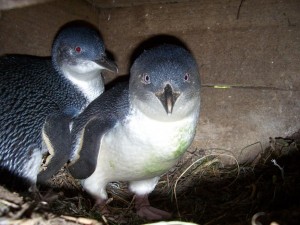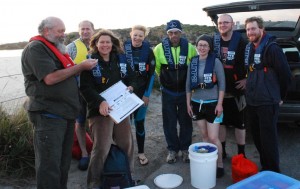Background Information on Middle Island and the Penguin Monitoring Project
Middle Island is a small (approximately 2 ha), rocky island off the Warrnambool coastline, surrounded by the Merri Marine Sanctuary. Recently closed to the general public, the island provides important breeding habitat for a colony of the iconic Little Penguin, Eudyptula minor. The Little Penguin’s breeding season at the island occurs generally from mid-winter and continues through the summer, and includes clutching, brooding, and foraging activities.

Middle Island, Warrnambool

The Little Penguin
Fox predation is considered to be the most significant land-based threat to the Little Penguin in mainland sites of south-eastern Australia. Because of its proximity to the mainland, during low tides Middle Island becomes accessible to predators such as foxes and stray dogs. In particular the presence of, and predation by, foxes on the island saw the breeding population drop dramatically from approximately 500-1000 breeding adults in 2001.
In response, the local community and Warrnambool City Council implemented an innovative and world-first Guardian Dog Program to tackle the fox problem in 2006. Maremma dogs, historically used for livestock protection, were trained and stationed at the island to guard the colony and deter foxes. To learn more about the Maremma Project, visit the Warrnambool City Council project page at www.warrnambool.vic.gov.au/index.php?q=node/943.

Maremma guardian dog
Since 2001 Warrnambool Coastcare Landcare Group members and volunteers have taken on the important role of conducting penguin arrival and breeding monitoring. This is reflected in the extraordinary number of volunteer hours and in-kind support provided each year. The group’s aim is to improve biodiversity by protecting and enhancing the coastal environment through active community partnerships and group participation, with group activities including revegetation and weed control works, supporting and assisting marine research projects, and providing community education and volunteering opportunities. To learn more about the WCLG or to get involved, visit their website at www.wclg.com.au.

The WCLG receiving a National Landcare Award for the group’s involvement in the project in 2010
Ongoing monitoring of the Little Penguin at Middle Island has been a critical program for first detecting the severe decline in arriving adults at the island and then in assessing the success of the Maremma Guardian Program. The peak in the arrival of birds over the 2006/07 season was 70 individuals counted, and now – five years later – the spring count in 2012 reflected the continuation of a long term improvement, with approximately 170 individuals recorded. This increase in Little Penguin numbers correlated with a cessation of fox kills observed at the island, and suggests the mitigation of fox predation on the island is contributing to the restoration of a viable, reproductive colony on Middle Island.
The Little Penguin monitoring involves both an arrival count approximately each fortnight during the breeding season, as well as breeding surveys where next boxes and burrows are assessed for adult occupancy, eggs, and chicks. The arrival counts are conducted at night-time when the adult penguins arrive back from their foraging at sea to their burrows, eggs and chicks. A team of approximately 10 to 13 volunteers cross over to the island during low tides and are posted at designated counting sites. Once the first penguin arrives around dusk, the team start counting for one hour. The total number counted can then be used to estimate the total number of penguins on the island at that time, with past research indicating that approximately 60% of birds are known to arrive within an hour following the first arrival.

WCLG volunteers preparing for an arrival count

